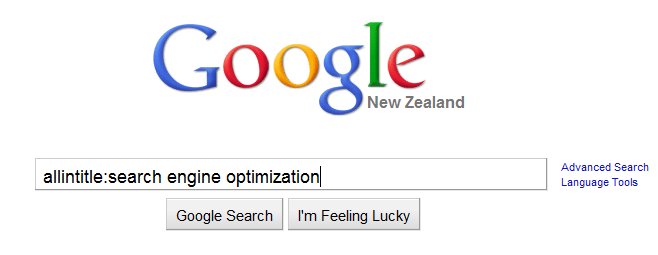A very important aspect of keyword research is gauging the number of competing sites.
Typically, almost everyone will do a keyword phrase search in quotes to get an idea of the number of sites that contain that particular keyword phrase.
On the back of that, doing an allintitle search, can be very useful as it will give you an idea of the number of sites that have that keyword phrase in their page title. This is important as page titles carry more weight than the same keyword phrase contained within the article body.
However, if you are looking at the number of results that Google returns, then you could well be relying on incorrect or inconsistent data.
Video Overview
The following video shows you exactly what I’m talking about with the inconsistent Google allintitle results.
Allintitle Results With and Without Quotes
For the purposes of this article, I’ll be using the keyword phrase: search engine optimization
It’s important to note that the results will vary depending on your location and changes to the Google search algorithms, but as far as I can tell, the inconsistent numbers has been around for a while.
OK, so let me show you can example of exactly what I’m talking about.
First, I’ll do an allintitle search for search engine optimization without the quotes
 Google reports there are 518,000 results:
Google reports there are 518,000 results:

Remember that without quotes, Google will be returning pages with any combination of the words “search”, “engine” and “optimization”. For example, one of the sites listed on page one has the title:
Search Engine Submission Optimization
Now let’s do the same allintitle search, but with quotes:
 Now in theory, as this is searching on exact matches, ie: titles with the phrase “search engine optimization”, we should get a lot less results than searching without quotes.
Now in theory, as this is searching on exact matches, ie: titles with the phrase “search engine optimization”, we should get a lot less results than searching without quotes.
So, what numbers does Google give us?

Yep, you read it right. That’s over 3.5 million!!
That’s 700% more than broad match allintitle search!
How’s that for inconsistent and misleading results.
OK, so what’s going on with the figures?
Well, it’s important to note that the search results figures that Google gives you on the first page is just an estimate, otherwise it would slow down Google search results if it had to search through the entire set of data for each search request.
A Better Method of Comparison
For any Google search, it will return a maximum of 1000 results. By that, I mean if you keep clicking on “Next”, Google will give you a maximum of 99 pages (assuming you use the default of 10 results per page) of results.
Most of the time, the maximum number of results pages will be less than 99.
OK, so let’s go back to our example allintitle searches, and view the results in a different manner.
Let’s do our search with:
allintitle:search engine optimization
Now, you could keep clicking on the “Next” link to take you to the last page, but you’d soon get sick of all the clicking.
To speed up the process, click on “Next” to go to page 2 of the results, and then in the URL in your browser, look for where it has:
start=10
and change it to
start=990
and then press Enter.

This will take you to the last page of results and at the bottom of the page, you’ll see:

Now if we repeat the steps and do the search in quotes, you see the results:

So for the search without quotes, we get 857 results and with quotes it is 618.
This is much more consistent and along the lines of the results you’d expect for broad and exact match searches.
What’s the Bottom Line?
Probably the main moral of this article is to not rely too heavily on the results Google gives you. By all means, do an allintitle search, but if you find the figures it is returning don’t agree with some of the other metrics you have checked, then it’s quite possible it’s just one of those Google quirks to keep us internet marketers on our toes.
A much better metric to check is how many sites in the top 10 results have the exact match title you are searching for. If there are sites ranking in the top 10 that don’t use your exact search term in the title, then that gives you a reasonable idea it’s something you can go for.
If you’ve had a similar experience of inconsistent results from Google or have an explanation, please make sure you leave a comment below.
Cheers



Really useful Article Peter, Thank you.
I’ve been baffled by various of the google site operators and basically stopped using them. I think that now they are just legacy items – A kind of software fossil!
When push comes to shove you can’t get away from sizing up the competition on page one.
BTW some people say they get more consistent results when they use allintitle with google set to show 100 results per page.
Can’t say I’ve noticed any difference!
🙂
Hi Alex.
As you say, when it all boils down, the best way of gauging competition is to look at the top 10 results in Google.
Doesn’t really matter if there are 100 competing sites or 100,000. No one creates a site to rank on page 2 or lower.
Cheers
Peter
I think we all agree with the bottom line of focusing on taking out the top ten websites. I think it is also important to notice that many of the websites that may be included in this set of search data may not be very active, or even worse be nothing more than spam websites. I think the customer base would be the most powerful in determining what websites are best and which are much worse by content. While it is obvious having the right keywords is important, I would think great content is what can help maintain a website at the top of the search engine.
Very useful Peter, thank you. I look forward to reading more of your articles.
Kind Regards
Perry